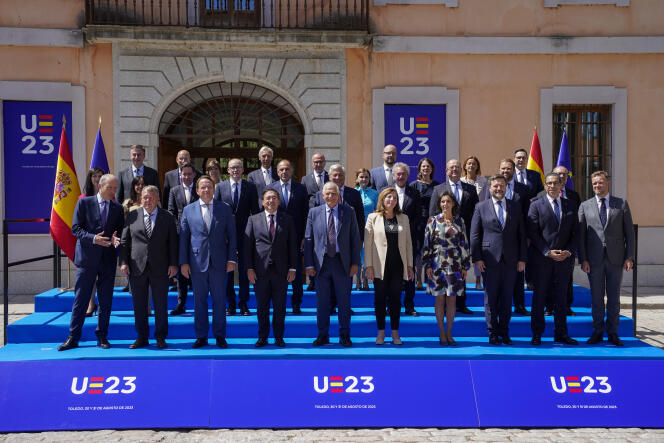


Gathered in Toledo, Spain, on Thursday, August 31, the European Union’s foreign ministers remained extremely cautious about the position to be adopted in the Sahel. While they agreed on the creation of a sanctions regime against the junta that has been in power in Niger since July 26, the same could not be said of the military situation. The prospect of military intervention, once mooted by the Economic Community of West African States (ECOWAS), has so far been totally ruled out. France, which supports this option if necessary, appears isolated.
The military coup in Gabon on August 30 was also mentioned, and condemned, but "it has nothing to do with the situation in Niger," stressed Borrell, the head of European diplomacy. "In Niger, a democratically elected president was deposed, while in Gabon, the president was re-elected after elections whose democratic nature raises many doubts."
In general, Bongo’s fate was much less discussed than that of his Niger counterpart, Mohamed Bazoum, who has been under house arrest since July 26. "The coup in Niger marks a new era of instability in the Sahel region," said Borrell. "And the foreign ministers were very clear: priority must be given to diplomatic channels to restore constitutional order. They also reaffirmed their desire to find an African solution to an African situation, hence our support for ECOWAS."
Invited to Toledo to explain the situation on the ground, the president of the ECOWAS commission, Omar Alieu Touray, and the foreign minister of the overthrown government in Niger, Hassoumi Massoudou, reiterated that "the only framework for managing this crisis is that of ECOWAS." On Thursday evening, its president, Bola Tinubu, head of state of Nigeria, suggested in a statement a nine-month transition for the military in power in Niger, as had happened in his country in the 1990s. The sanctions imposed on Niger by the organization will not be eased without "positive adjustments" by the military in Niamey, the statement continued.
"Europe must not be seen to be imposing its solution from outside," said Alexander Schallenberg, head of Austrian diplomacy. His French counterpart, Catherine Colonna, kept a low profile, avoiding microphones and cameras. "Today, France is being targeted in Niger, so it’s not in its best interests to show off," explained a European diplomat.
In Niamey on the same day, Thursday, the junta announced the lifting of the diplomatic immunity of the French ambassador, Sylvain Itté, and asked the police to expel him from the country. France, which does not recognize the ruling military, has not responded. Borrell expressed his solidarity with Paris but called for greater firmness. "Some people think that this coup will go away on its own, as the United States thinks," said one diplomatic source. "But as we have seen in Mali and Burkina Faso, the return to democracy after a military coup is extremely complicated." To make an impact, added this source, "you have to exert continuous pressure. Without that, nothing will happen."
You have 31.98% of this article left to read. The rest is for subscribers only.
